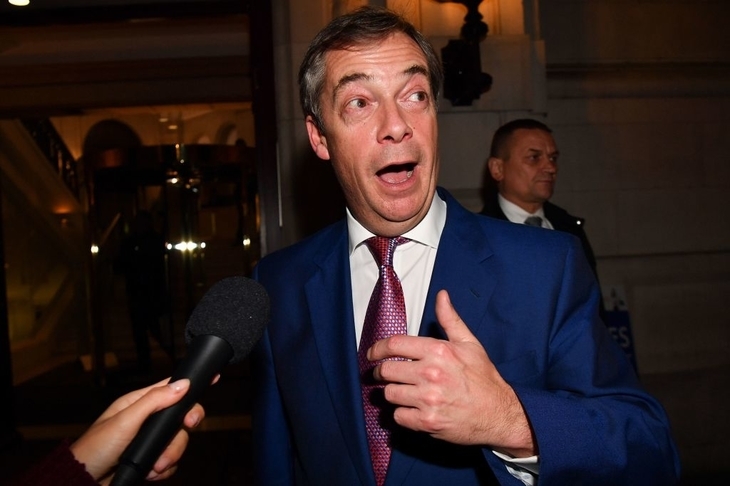The Brexit party has emerged as the big winner of the European elections. Nigel Farage’s party, formed just six weeks ago, surged to victory – winning 32pc of the votes and getting 29 of its candidates elected as MEPs. Only Merkel’s CDU has as many MEPs: they’re joint first. Unsurprisingly, Farage has been on a victory tour since the result came in. In his victory speech in Southampton, Farage said his new party’s success ought to be a ‘big wake up call to Westminster’ – and reiterated his demand for his MEPs to be including in the government’s Brexit negotiating team:
‘We voted to leave in a referendum and we voted to do so on March 29th and we haven’t. The Labour and Conservative parties can learn a big lesson from tonight but I don’t suppose that they actually will.’
So, what next for the Brexit party? Farage has made clear that he now plans to move the Brexit party to a general election setting: ‘If Britain does not leave the EU on October 31st, these results will be repeated at a general election.’
When I met with Farage on the campaign trail in Dudley, he told me about his plans for winning big in a general election – and why not even a new Tory Brexiteer leader who pursues a no deal Brexit could convince him to step aside:
- Politicians who want to dismiss success for the Brexit party in the Euros as a protest vote ‘don’t understand this dynamic’:
They don’t understand this dynamic at all. If I’d set this up and said ‘look, we’re going to give you a chance on the 23rd May to stick two fingers up’, they’d be lots of good reasons to stick two fingers up – but it’s not what these people want. It’s not what I want. You know, we’ve already won this battle once and it’s been denied us so people have made the connection in their minds that the problem isn’t winning a Brexit vote, the problem is getting a political system in Westminster that is prepared to reflect that view.
So there is a much more radical mood than there was back in the referendum – and I use that word in its proper sense of the term. This is about breaking the two party system. It’s about massive political change in this country. It’s about getting Westminster closer to the people.
2. A new Tory leader won’t be enough to convince Farage to stand aside:
‘I keep being asked “well if the next Tory leader is …” – well actually the Tory party may need more than another leader. The next leader will still try and keep two differing wings of the party together. It’s still not going to have a coherent message – unless of course something really exciting does happen.
CH: Would you be happy if you moved the Tories on to a no deal setting and that was the effect of the Brexit party?
‘Yeah, but how could I trust them? You know “the Tories say…” why would I believe them? I mean many of us were guilty of believing them last time round and it didn’t work. Why would I believe Boris? How can you write in The Telegraph that Mrs May’s deal reduces us to vassalage slave state and then vote for it? I don’t trust any of them.
I think the best chance the Conservatives have got to try and get us off their backs would be to get a leader who said clearly we are leaving on the 31st October on WTO terms, we’re scrapping the treaty and if the Tory party said that I’ve no doubt the electoral threat from us would diminish but it won’t go away… because we’re not going to make the same mistake as last time [of trusting the Tories to deliver Brexit]. That is not going to happen – believe me.
3. The first past the post voting system is a challenge the Brexit party is ready to take on:
‘I mean it’s very difficult to break through in first past the post politics. I know that more than any human being alive… alright, I’ve done it and here I am again, I mean I must be off my rocker.
Let’s put it like this. When Ukip got four million… just shy of four million votes in 2015, I reflected on it a few days later and I thought “d’you know what, actually that was pretty bloody good really”. I mean it’s a lot of votes, particularly given that in very few seats anyone thought we could win. So I was actually in the end quite proud of that number of votes, even if it didn’t lead to any seats.
This does not feel like a four million vote party – this does not feel like a four million vote movement. And the reason I’m saying that is historically a lot of people used to lend their vote – when I was in charge of Ukip – they’d lend their vote to Ukip in a European election thinking “well I’ve said what I think and that’s great and then at the general election I can go back to voting for the same party my grandad did” because that’s how tribal that allegiance is. This is different. A lot more people now are saying “no, no, we’re going to stay with you all the way through. So I think the threat that we post to the two party system is much, much greater. As I say, I believe that if there was a general election in the next few months, the Brexit party would get a lot more than four million votes.’
Michael Gove is in conversation with Fraser Nelson on Wednesday 5th June. Click here to book tickets







Comments